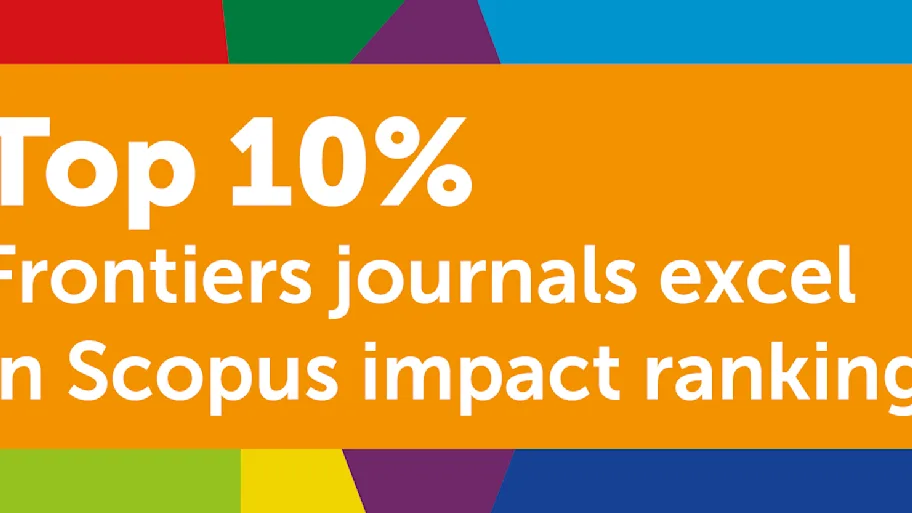
- Science News
- Impact analysis
- Journal impact: Frontiers in Psychology
Journal impact: Frontiers in Psychology
Frontiers in Psychology is the world’s most-cited journal in its field and ranks in the top Impact Factor and CiteScore percentiles

Frontiers in Psychology continues to rank among the world’s top multidisciplinary psychology journals in terms of influence and quality, as shown by our analysis of the 2017 Journal Citation Reports (JCR-2017; 2018, Clarivate Analytics), 2017 CiteScore edition (2018, Scopus, Elsevier) and other impact metrics.
The world’s most-cited journal in the JCR category of Multidisciplinary Psychology, with 7,397 citations in 2017 to 2,092 articles published in 2015 and 2016 (Figure 1)
The world’s 3rd most-cited journal in the CiteScore category of General Psychology, with 10,347 citations in 2017 to 4,676 articles published in 2014, 2015 and 2016 (Figure 1)
Ranks in the 71st percentile of journal Impact Factors in the JCR Multidisciplinary Psychology category, with an Impact Factor of 2.089 (Figure 2)
Ranks in the 77th CiteScore percentile in the General Psychology category, with a CiteScore of 2.21 (Figure 2)
11,200 published articles to date
63,3000 citations to date
54 million article views and downloads to date
Articles mentioned 5,100 times in the news to date
Articles mentioned 118,000 times on social media to date

Figure 1: Analysis of the top 10 most-cited journals in the JCR Multidisciplinary Psychology category (JCR-2017, released in 2018 by Clarivate Analytics) and CiteScore General Psychology category (2017 edition, released in 2018 by Scopus, Elsevier). Bar plots show the total number of citations in 2017 to articles published in 2015 and 2016 (JCR) and 2014, 2015 and 2016 (CiteScore), with Frontiers in Psychology in red. A total of 135 journals are listed in the Multidisciplinary Psychology category in the 2017 JCR edition, of which 14 are Open Access. A total of 189 journals are listed in the General Psychology category in the 2017 CiteScore edition, of which 37 are Open Access.

Figure 2: Analysis of Impact Factor and CiteScore rankings in the JCR Multidisciplinary Psychology category and CiteScore General Psychology category. Grey lines represent all journals in each category ranked by their 2017 Impact Factor and CiteScore percentiles, with Frontiers in Psychology shown as a red dot. Impact Factor is the average number of citations received in 2017 to articles published in 2015 and 2016, while CiteScore represents average citations in 2017 to articles published in 2014, 2015 and 2016. A total of 135 journals are listed in the Multidisciplinary Psychology category in the 2017 JCR edition, of which 14 are Open Access. A total of 189 journals are listed in the General Psychology category in the 2017 CiteScore edition, of which 37 are Open Access; however the analysis here includes only those journals with a full three-year publication history, that is, with published articles in 2015, 2016 and 2017.

Top research in 2017
2017’s top psychology articles include the latest discoveries and insights into the effects of video games, the impacts of different education approaches and the persistence of neuromyths.
Hottest Research Topics
The impact of virtual and augmented reality on individuals and society
Grand challenges for psychological science in the 21st century
Embodied Cognition over the lifespan: theoretical issues and implications for applied settings
One of the ten Research Topic finalists in the 2017 Spotlight Award was also published in Frontiers in Psychology:

Top article picks
Montessori preschool elevates and equalizes child outcomes: a longitudinal study
Dispelling the myth: training in education or neuroscience decreases but does not eliminate beliefs in neuromyths
Lack of evidence that neural empathic responses are blunted in excessive users of violent video games: an fMRI study
Mathematics anxiety and statistics anxiety. Shared but also unshared components and antagonistic contributions to performance in statistics
Gendered pathways: how mathematics ability beliefs shape secondary and postsecondary course and degree field choices
Taking the perfect selfie: investigating the impact of perspective on the perception of higher cognitive variables
Different teams, same conclusions? A systematic review of existing clinical guidelines for the assessment and treatment of tinnitus in adults
Smartphones and cognition: a review of research exploring the links between mobile technology habits and cognitive functioning
Whose expertise is it? Evidence for autistic adults as critical autism experts
“Maybe I will just send a quick text…” – an examination of drivers’ distractions, causes, and potential interventions
Scientific excellence at scale
The impressive performance of Frontiers in Psychology — and all Frontiers journals listed in the JCR and CiteScore metrics — reflects the continued success and influence of the Frontiers Open Science model of scientific excellence at scale.
All of this is only possible thanks to our research community and stellar editorial board. Frontiers congratulates Field Chief Editor Axel Cleeremans and all Specialty Chief Editors, as well as the diligent work of the Associate and Review Editors, authors and the Frontiers Journal Management team, for this outstanding achievement.






